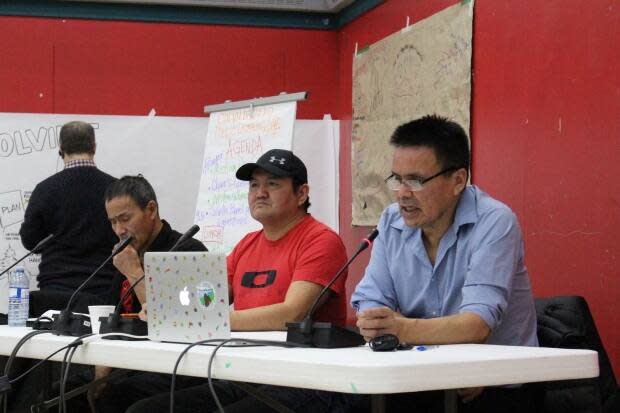Colville Lake one step closer to finalizing caribou conservation plan
The Sahtú Renewable Resources Board has given Colville Lake, N.W.T., a seal of approval to move forward with its community-based caribou conservation plan.
In a report released at the end of October, the board declared that "harvest regulation for all caribou populations must be subject to community conservation planning measures."
The decision comes after N.W.T. leaders convened in Colville Lake in January for a three-day public "listening session" on how best to protect and regulate the harvest of three of the territory's caribou herds.
David Codzi, who helped lead the charge for a local conservation plan, welcomed the board's decision. He said his people's way of life is centred around conservation.
"Our whole belief is to make sure that there's always caribou; it's not to over hunt. We only take what we need, and we can't just … allow somebody else that's just been here not too long just to put their way and say that's the right way," said Codzi, who is president of the Ayoni Keh Land Corporation in Colville Lake.
"We've been here thousands of years and this is the way we practice our way of life, and it's worked this long. You know, it's tried and true and it's our experience."
8 decisions, 18 recommendations
The board's report includes eight decisions and 18 recommendations on issues related to caribou harvesting regulations in the Sahtú region.
Among them is a commitment from the board to remove the total allowable harvest — which limits how many animals can be harvested from the herd. Before that can be done, the Sahtú Renewable Resources Board says Colville Lake must submit the outstanding components of its conservation plan: an outline of caribou monitoring and harvest monitoring information, a caribou conservation and food security plan, and an evaluation framework.
Once the plan is approved, it will replace the total allowable harvest system in the Sahtú region, and the Wildlife Act regulations would need to be updated to reflect that change, said Deborah Simmons, executive director of the Sahtú Renewable Resources Board.
The board says it will regularly review conservation outcomes under the community plan, and that it reserves the right to reinstate the total allowable harvest if needed.
Codzi said Colville Lake still needs to outline how it will execute its plan, but added, "we know that we're going to be using people that go out on the land.
"Since 2007, we've been working at this and we've been monitoring what people do, how they go hunting."

The board also recommended that tagging requirements for Indigenous harvesters be scrapped, and that the environment minister grant the Colville Lake Renewable Resources Council the authority to issue authorizations to harvesters.
Codzi said he doesn't believe tagging or quota systems are the best approach.
Instead, Colville Lake's conservation plan would require people to inform the community of their hunting plans, so the community can give them permission, he said.
"People will take what they need. They don't have to feel like they have to take … all the tags," Codzi said. "Some people go hunting, some people don't. And the last couple years, we haven't hit the number that they set aside."
Next steps
The report also calls on Colville Lake to work with harvester groups in neighbouring regions so they can develop conservation plans that meet their shared goals.
Youth will "be invited to play meaningful roles in the entire process for future public listening sessions," the board decided.
Simmons said the board's report is now in the hands of the N.W.T.'s environment and natural resources minister.
The minister has 60 days from the time of receiving the report on Oct. 31 to "vary, set aside, or accept" the board's decisions, Simmons said.
"If the minister agrees to the board's recommendations and decisions, then the minister would be required to follow up on those decisions and recommendations, in so far as it's within [Environment and Natural Resources's] mandate."

